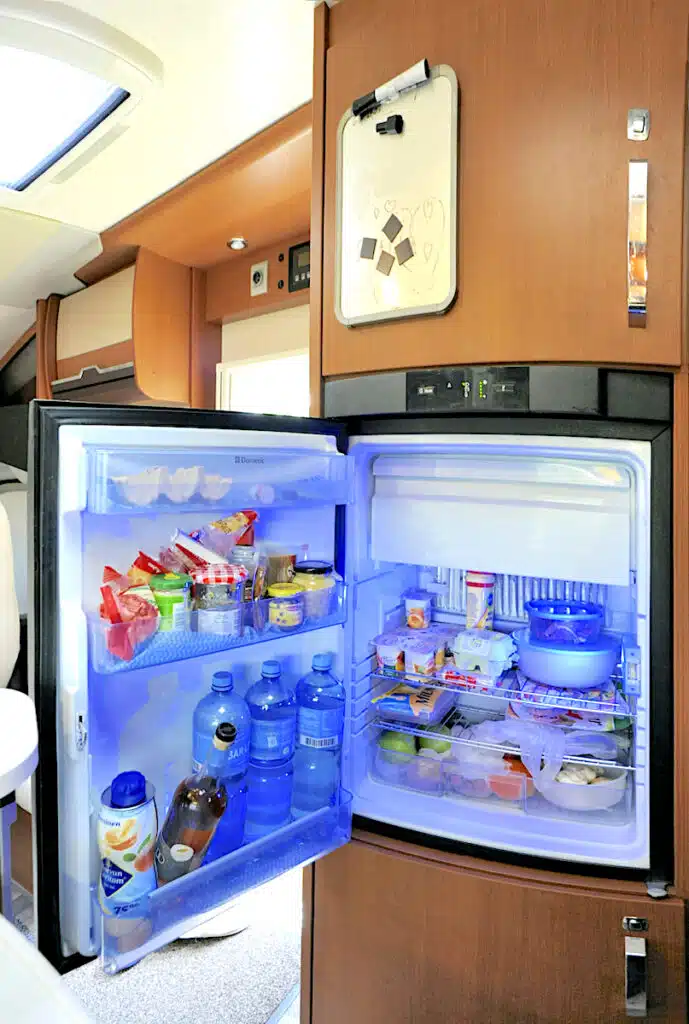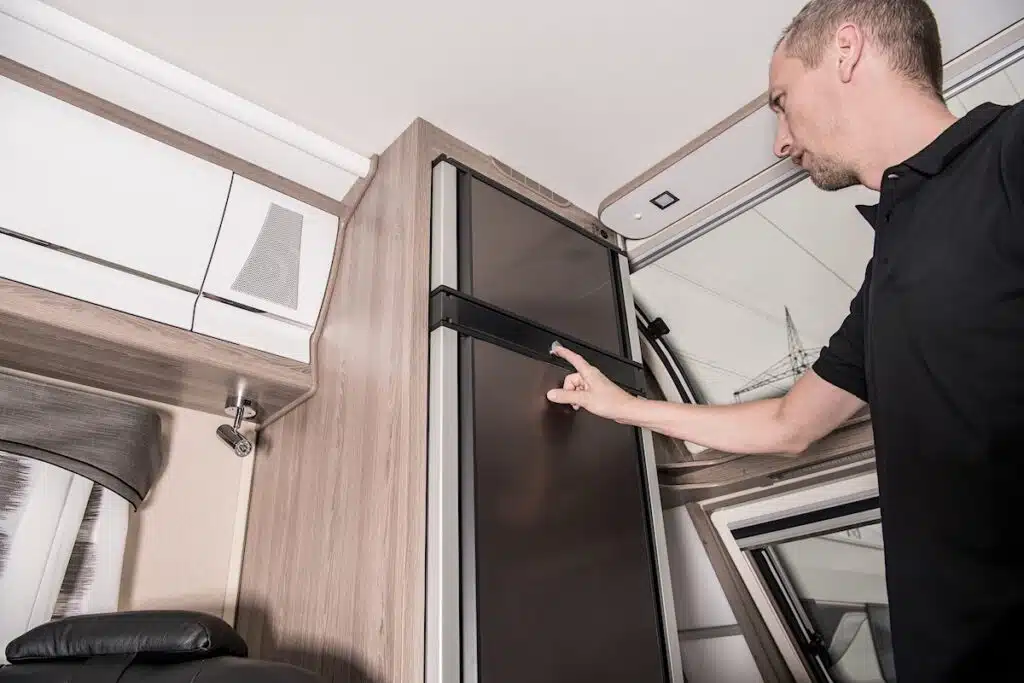If you make a purchase using links in this article, I could receive a commission. Please see my Privacy Policy for information.
Keeping food cold versus bringing dehydrated food is one of the biggest differentiators between camping and RVing. Your RV refrigerator is one of the most important components. Regardless if your RV trip is a weekend getaway or if you plan to hit the open road for multiple weeks, keeping select food items cold is a must.
Can I run my RV fridge run on battery power? This is one of the more popular questions we receive from folks new to RVing. The short answer is, yes….but let us explain.
For this discussion, we are excluding RVs that have been modified or upgraded to a lithium ion battery bank and charger system. The majority of RV’s come equipped from the factory with deep cycle batteries, often referred to as ‘house’ batteries. Depending on the size and options of your RV, you may only have one or two house batteries. Fully charged, your RV house batteries will give you a limited amount of life prior to being required to be recharged.

How Long Will an RV Fridge Run on Battery Power?
There are several factors you should be aware of to thoroughly answer this question. Factors that will determine how long you can run your RV fridge solely off your house batteries include:
- What type of RV refrigerator: can it run off multiple types of power sources?
- What is the capacity in terms of amp hours (Ah) of your RV house batteries?
- Are you able to charge your RV house batteries while traveling?
- Will you be off the grid at your final destination?
- Will your final destination have shore power or can you use a portable generator?
- What other RV components do you plan to use while running your refrigerator?
Depending on the answer to these questions regarding your specific RV and RV travel style, your RV refrigerator may run off your house batters somewhere between 2 – 8 hours. The more you know about your RV specifics will help narrow down this broad range of time.
If you plan to run other electrical RV components on your RV’s house batteries, such as internal or external lights, the water pump, portable fans, portable radios, etc., these will all be pulling electrical current from your RV batteries in addition to your RV fridge. Factor this into your intended overall use time of your house RV batteries.
RV Refrigerator Types
The 3 main fridge types in an RV are typically categorized as ‘1-way’, ‘2-way’ and ‘3-way’ fridges, otherwise known as residential, compressor and absorption refrigerators:
Residential fridge – These are the large floor-to-ceiling style of fridges you typically find in Class A RV’s and they are known as ‘one-way’ RV fridges because they can only run off of shore power from a generator or with an inverter to convert the DC batteries of your RV into AC power your residential fridge can then use.
Compressor fridge – Compressor or 2-way fridges run on 12 or 24-volts powered either by your RV house batteries or they can run on a maximum of 120-volt power via shore power from a campsite or a portable generator connected to your RV.
Absorption fridge – Absorption fridges or 3-way fridges run on 12 or 24-volt power similar to compressor refrigerators. However, they can also run on propane (or LPG gas). Absorption refrigerators use a gas flow heat exchange system cooling the fridge by removing heat instead of creating cold air.
What is the capacity of my RV house batteries?
Again, for this explanation we assume your RV has the industry standard deep cycle type house batteries. We are excluding the use of lithium ion batteries and recharging systems from this discussion since lithium ion batteries can have longer de-charging timeframes and they are often an expensive (several thousand dollars) factory or aftermarket upgrade to your RV.
Most RVs have 12-volt deep cycle batteries. So, if you have a 12-volt battery with a rating of 100 amp hours (Ah) for example, your battery would put 5 amps of power per hour for 20 hours until it was completely drained. Using this example equation will help you determine your RV’s overall battery capabilities.
We suggest you evaluate your particular RV house batteries to see what a) their voltage is and b) how many Amp hours (Ah) they are rated for. Knowing this information will help determine how long your fridge can run solely on your house batteries.
Will an RV Fridge Run On Battery While Driving?
Yes! Driving is a good time to run your fridge and other appliances on battery power since the battery is actively being recharged by your tow vehicles alternator – assuming you connect your RV to your tow vehicle via a 7 pin connection using the proper gauge wiring and recharging setup in your RV to accomplish this.
One thing to consider is the size – output in amps – of your tow vehicle’s alternator. Typically, most full-size trucks or larger SUV’s with tow packages have a factory installed alternator that can accommodate the functions of your tow vehicle plus recharging your RV’s house batteries. It is suggested you have a minimum 160A – 180A alternator in your tow vehicle to accommodate these activities.
Using a Portable Generator and Shore Power to use Your RV Fridge
An alternative to running your RV refrigerator solely off your house batteries, is connecting your RV to either 120V shore power or using a portable generator one you reach your destination. These options will give you the opportunity to run your RV fridge on your RV’s house batteries while traveling, then switching the RV refrigerator’s power source to either shore power or propane upon arriving.
✅ Check out our RV portable generator guide!
Understanding the amperage of your RV’s electrical system will be importantOne con of having a generator is that they can be bulky and take up extra real estate in your RV, but they can also be your lifeline when there is a power outage, and there is no risk of a fire like there is with using propane.
Does an RV Fridge Cool Faster on Propane?
Yes, an RV fridge running on propane will cool much faster compared being powered on house batteries. Propane is a more efficient power source for RV refrigerators thus resulting in faster cool-down temperatures.

Does an RV Fridge Need a Battery to Run On Propane?
Yes, an RV refrigerator still needs a small amount of electrical power to run its internal components even when its main cooling power source is propane (LP Gas). This power can be provided by either the RV’s house batteries or shore power. Power is required for internal components such as the thermostat vital for monitoring and maintaining its internal temperature.
How Long Will an RV Fridge Run On a Tank of Propane?
The efficiency of every propane fridge varies depending on the type of refrigerator, size, how cold you have it set, etc. Generally, a standard 20 pound propane tank should allow the average RV fridge to run for 7 – 9 days non-stop. Here are some tips in maximizing your RV’s efficiency while running on propane:
- Check the temperature setting – keep your refrigerator at a proper internal temperature setting that will safely keep refrigerated items cold but not frozen.
- Make sure your refrigerator has proper airflow – This is especially important with condensing refrigerators. Keeping the internal cooling components cool and having good external air flow via the vents is important in maintaining the fridge’s cooling cycles.
- Don’t overfill the fridge – Over-filling your RV fridge will decrease internal circulation within the cold compartments. If you plan to fill your fridge for a trip, consider a fridge fan. These will help increase circulation when driving on sizzling days. In some cases, it can help cut down on cool down time by as much as 30 percent.
- Keep the RV out of direct sunlight – if possible, park your RV in the shade to keep the internal temperature of your RV as low possible. If your RV is parked in direct sun all day this will heat up the ambient temperature around and inside your RV potentially causing your RV fridge to work harder to maintain its cool temperature thus using more propane.
How Long Does an RV Fridge Take to Get Cold?
Again, this will vary depending on the model and type of RV fridge you have. However, on average, most RV refrigerators should take 4 to 6 hours to get cold enough to safely store food items. We suggest before your first travel day of a trip, pre-cooling your RV fridge prior to stocking it with food items. If possible, try using shore power and not your RV batteries or propane to pre-cool your refrigerator.
